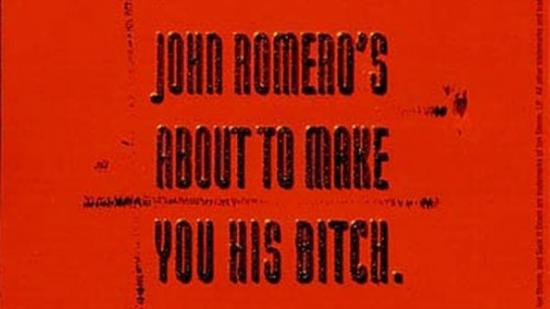Try as we might, there’s no escaping the hype machine. Not unless you’re prepared to live completely off the grid, collecting rainwater each morning, harvesting anaemic mange tout and and giving them to a woman named Moon Unit to make into a gritty soup for your collective of wild-eyed survivalists.
Go on, click on our best PC games feature. If you do, we’ll release a flock of doves with PCGamesN logos spraypainted on them during a big sporting event.
No, for those of us who like electricity and pulled pork too much to dissociate from society, the best we can hope is that the world of marketing at least speaks to us like human beings. And not, say, offering to pay for our loved ones’ gravestones in exchange for slapping an advert on them, or pretending there’s a terror attack going on via Twitter. Isn’t that right, videogames PR?
Our favourite hobby comes with a long and morbidly fascinating history of marketing strategies as bold and progressive as they are irresponsible. Every so often I read about a stunt someone pulled back in the nineties and think “Wow, imagine if they tried that today,” and then I remember that someone else tried something just as silly just the other week.
There are two ways to respond to it all: you can sit, glassy-eyed, shaking your head from now until eternity, or you can force yourself, kicking and screaming, into a sunnier disposition and be thankful that at least the end result of all this is just a videogame and not a nuclear warhead or fascist dictatorship. With that cheerier outlook duly summoned, let’s pick out the all-time greats at setting all-time lows.
When EA offered to pay for your petrol to promote Mercenaries 2 and caused “A Venezuela-style fuel riot”
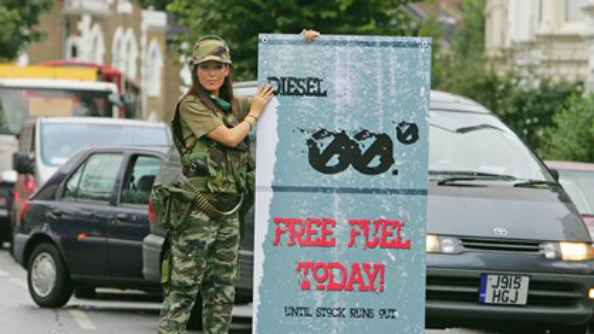
There are multitudinous ways to promote an action-adventure sequel set in fictional war-torn Venezuela, and perhaps the kindest thing that can be said about EA’s decision to give away £20,000 worth of free fuel in central London back in 2008 is that it is, indeed, one of them.
As with any instance when promotional models, dressed as what Peter Stringfellow might imagine guerrilla fighters look like, give away tank after tank of petrol up to a maximum value of £40, the event descended into absolute chaos. The idea was that Mercenaries 2 was set in a dystopia in which fuel is used for currency. Ergo: let’s try to turn Hornsey into that dystopia.
Traffic was gridlocked in (an admittedly small section of) central London as motorists descended on said bargainous fuel. Arguments broke out. Police got involved. Eventually – inevitably – the operation was shut down, and the sexy Stringfellow guerrillas presumably spent the rest of the day trudging sadly up and down until they had to give their gunbelts back to the costume hire place.
MP for Hornsey and Wood Green, Lynne Featherstone, later demanded EA apologise to her constabulary for “Trying to recreate Venezuelan-style fuel riots on the streets of London” and claimed that their stunt meant “hundreds of local residents have faced misery on their daily journeys.” And that EA were “a right bunch of tits.”
And while I’ve just invented that last quote out of thin air back there, it’s as as accurate in retrospect of the stunt as it was when Featherstone said it/didn’t say it in 2008.
That Juiced ad in which two guys strip a horrified bystander naked with their controllers
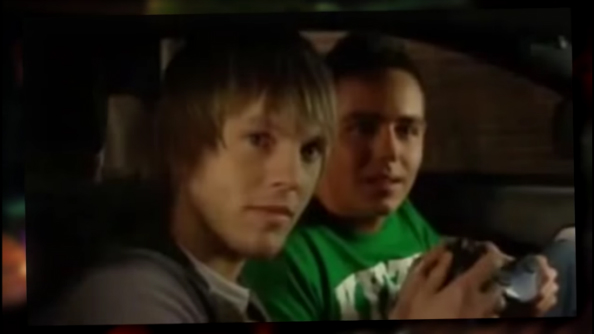
They say sex sells, but that’s only really true to a certain extent. Running an ad campaign for The Best Exotic Marigold Hotel in which the principal actors titillate with their bare flesh would not have the same impact on its audience as Eva Herzigova’s iconic Wonderbra commercials had on theirs.
Nor do a pair of frat boys barely concealing their guilty erections as they strip a poor girl naked do much for 2005 racer Juiced. Granted, there’s female nudity, and if seeing women in a state of undress is something you’ll strive to achieve at all costs, you’ll love THQ’s approach to videogame promotion. However, if context has any bearing at all on the visual stimuli your brain processes, you’ll probably find the fact that the bystander in question is visibly scared and upset by her phantom disrobing to be a bit of a libido-dampener.
The ad (which I’m not going to link here because I’m not here to do it any favours, and because you know how Google works) features the above adolescent males playing Juiced on the dashboard of their car, before suddenly realising that their controllers are in fact manipulating – and if you’re a thirteen-year-old boy you already know the end of this sentence – a nearby woman’s clothing and boobs.
They’re customising her, you see, like they would one of the cars in the game. Except they wouldn’t strip all the bodywork off a car and slap a Juiced sticker on its posterior, would they? Juiced isn’t about racing around in bare rollcages with exposed engines rattling around in them. And even if it were, that wouldn’t negate the fact that this ad is the very definition, in a literal sense, of “objectifying women.”
Somebody somewhere saw sense – before the ad had time to air it was banned. It was unlikely to change Juiced’s fortunes in any event – it was the driving game equivalent of sitting in a beige room and eating mouthfuls of toilet paper.
When Ubisoft sent a beeping package in the mail and prompted a bomb squad visit in the name of Watch Dogs
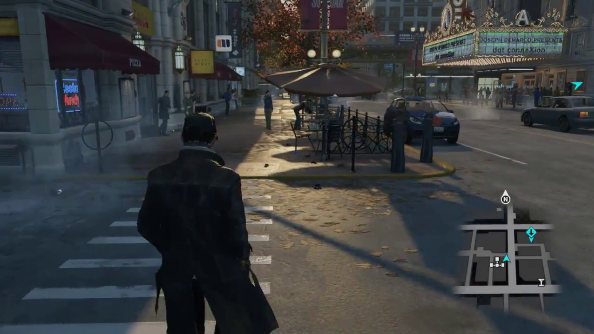
People had heard of Watch Dogs prior to this 2014 stunt. People were talking about it, excited by it. Watch Dogs was on the map. It was just about to come out, actually, dragging a months-long train of carefully devised marketing strategy behind it,when Ubisoft decided it might be a laugh to send a beeping package in the mail to Australian news outlet NineMSN.
Within the package was a safe containing two copies of the game, two baseball caps, and a note politely asking not to write about the game before a coverage embargo lifted. Of course, you’d only know that by opening the package. And in order to do that, you’d have to decide, yes, I’m going to tear open this beeping parcel now.
Wisely, NineMSN (who don’t even report on videogames) decided to take a few precautions before opening the probably-not-a-bomb-but-might-be-a-bomb. After phoning round other newsrooms in the area and being told no one else had recieved a similar package, publisher Hal Crawford and the team decided to call the authorities.
The authorities responded by deploying a Police Rescue Unit and four accompanying squad cars to the central Sydney offices. I’m speculating as to the subsequent sequence of events, but I imagine the arriving police prescence weren’t any more excited about rebellious hacker Aiden Pearce’s upcoming open-world game when they left than they were when they woke up that day.
When Ubisoft sent a guy armed with a fake gun into a pub district and nearly got him shot by a police armed response unit
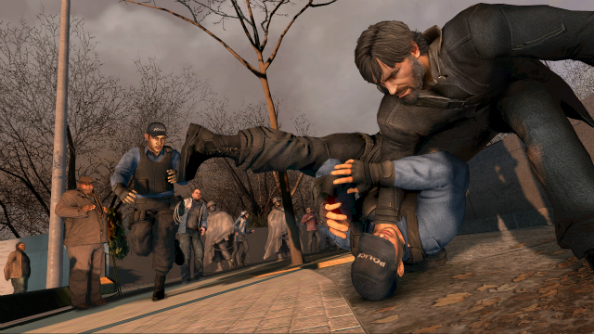
Oh hi again, Ubisoft.
Years before they were troubling the authorities with their mail, the publisher already had priors in field of ‘bizarrely dangerous ways to promote videogame releases’.
Back in 2010 Splinter Cell: Conviction needed some PR-ing, and Ubisoft outsourced that PR-ing for Australia and New Zealand to an agency called Monaco, who then outsourced it to still another, unnamed agency. Somewhere along that line the essential message ‘Let’s get people excited about our upcoming stealth action title’ turned into ‘Let’s send an apparently armed man with bandages on his hands into a bustling nightlife district to point his gun at bystanders.’
And so that exact thing transpired. The authorities responded exactly as you’d imagine, sending an armed response unit to subdue the mystery man The not-really-armed-but-who-wants-to-take-a-chance actor never got to the part in his script that presumably made all those terrified denizens suddenly ravernous for Splinter Cell, and the stunt was laterwidely condemned.
When Eidos thought this sexy, sexy corpse would get you excited to play Hitman: Blood Money

Unlike certain other titles on this list that I don’t need to name because they’re Juiced and Mercenaries 2, Hitman: Blood Money is a very good game indeed. A modern classic, really. You could have taken out a double-page ad in a magazine that said “It’s like Contracts but a bit better” in size 14 Times New Roman text on a completely blank background and the game would have sold milions.
But why pass up a perfectly good opportunity to make a model look like she’s been shot in the forehead, dress her in lingerie and arrange her on a satin sheet? Why indeed, Eidos circa 2006.
I suppose it’s only fair to mention that the above ad was one of a series, in which various unfortunates were pictured post-assassination accompanied by a punny caption (“coldly executed” and a picture of a man in a walk-in freezer, for example). I wouldn’t want to remove the above image of its broader context, so there it is.
Yeah, it’s… it’s still bad, isn’t it? It isn’t even that it’s a woman in her underwear, or that she’s dead. It’s that someone, somewhere, is saying to you ‘THIS is what I think you like. This imagery is what’s required to harness your interest.’
You could sit and ponder on the semantics of what “beautifully executed” means in relation to that image, and become more and more convinced that the nature of humanity is inherently evil. It’s probably best not to, though, and instead pretend this ad simply never happened. Because Hitman: Blood Money deserved better.
When John Romero wanted to make you all his bitches

Also known as ‘El Classico,’ Romero’s full-page ad in several gaming magazines is the founding father of hand-in-mouth games marketing moments. Its failings don’t begin and end with its confrontational wording (“John Romero’s about to make you his bitch. Suck it down.”) although it’s certainly a good start if you want to totally alienate your audience.
No, it’s more about the climate at the time the advert ran in 1997. Firstly, it happened during an awakening period for publishers and advertisers whose attention had recently settled on l33t sp3ak and gamer trash-talk, and had wrongly assumed that employing their tin-eared aproximation of that parlance was a fun way to engage with gamers. See: every game ad in the late nineties.
Secondly – crucially – Daikatana would turn out to be absolute garbage. In development since 1997 and acquiring an increasingly moldy smell with each passing year, it was a game ill-positioned to start puffing its chest out and starting fights with people, as its critical reception years later in 2000 would eventually reveal.
Romero himself knew it wasn’t the best idea, and has since apologised for the whole debacle. Marketer Mike Wilson did have his way though, and made abysmal games marketing history with the infamous blood red advert.
When the Call of Duty twitter account pretended it was a news aggregator live-reporting an unfolding terror attack to sell you a videogame
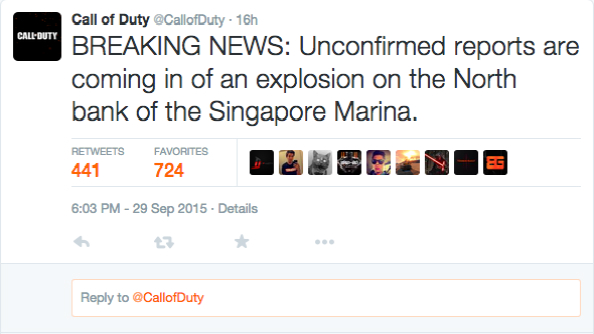
Classy.
If I talk about this one too much I only end up getting angry and having to scream into a cushion, so I’ll keep it brief. Once upon a time there was a game franchise called Call of Duty, whose games regularly sold in the tens of millions and had enjoyed an enormous fanbase for over a decade. One day in September 2015, someone in charge of keeping COD in the gamer’s collective mind decided to pretend there was a terror attack going on in Singapore, and use the franchise’s Twitter account with its 3.2 million followers to share that pretend-terror attack as it was ‘happening’.
This person or persons changed the Twitter account’s branding so that it was called ‘Current Events Aggregate’ and had the tagline ‘Where we bring you real news.’ The account’s handle was still @CallofDuty, so you could see through the facade if you were paying attention, but that’s a bit like pretending you’ve died and waiting for the sound of genuine fear to enter a loved one’s voice before jumping up and shouting “Psyche!” Which is to say, not a very dignified way to conduct one’s affairs. Finally, after a string of unsettling live tweets about explosions in downtown Singapore, they revealed that it was all an ‘insight’ into the dystopian reality featured in the next Call of Duty.
And yes, they did that in the year 2015, as in last year.
It took Activision and Treyarch a good few days to apologise for the tweets (which they also didn’t take down for quite a while afterwards, but have since done so I can’t embed them here). In the end it fell to Black Ops III game director Jason Blundell to do the apologising, remarking that he was “shocked” by the negative reaction to the stunt. Huh.
The above examples are but drops in the ocean of beyond questionable PR stunts – which of your old favourites haven’t we mentioned above?
